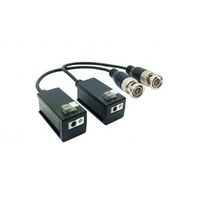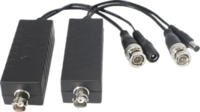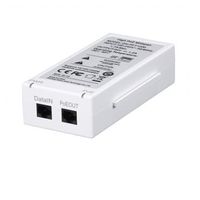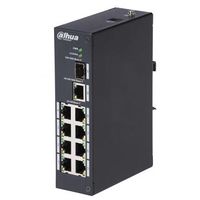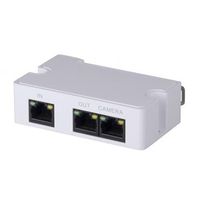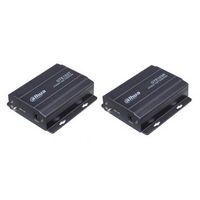Troubleshoot/Cable Distance Limitations and Solutions
Cable Distance Limitations and Solutions
Description
When scoping out a potential location to install a security system, there are often challenges with cable distances. Longer cable runs can be especially challenging if you don't know how to work around these issues. Below are several solutions for HD-CVI and IP bases systems that need cable runs longer than the standard cable distance limitation.
HD-CVI Cable Limitations
HDCVI
- 1280H(1280×720): 500m (1640 FT) via Φ75-3, 650m (2132.55 Ft.) via Φ75-5
- 1920H(1920×1080): 300m (984 Ft.) via Φ75-3, 400m (1312 Ft.) via Φ75-5
HDCVI 3.0
- 4MP(30fps) and 8MP(4K, 15fps) 300m (984 Ft.) via Φ75-5
HD-CVI Solutions
Baluns
- Transmission Distance with 2 Passive Baluns: 1000 Feet
- Transmission Distance with 1 Passive, 1 Active Balun: 4000 Feet
- Transmission Distance with 2 Active Baluns: 6000 Feet
A balun is an electrical device that converts between a balanced signal (two signals working against each other where ground is irrelevant) and an unbalanced signal (a single signal working against ground or pseudo-ground). A balun can take many forms and may include devices that also transform impedances but need not do so. Transformer baluns can also be used to connect lines of differing impedance. Sometimes, in the case of transformer baluns, they use magnetic coupling but need not do so. Common-mode chokes are also used as baluns and work by eliminating, rather than ignoring, common mode signals. -Wikipedia
Power Over Coaxial (POC)
- PFM810
| Cable type | Input Voltage | Distance | Output Power |
| 75-3 | DC24 | 0-100m | DC12V 4W |
| 100-150m | DC12V 3W | ||
| DC36 | 0-100m | DC12V 9W | |
| 100-200m | DC12V 6W | ||
| RG59(75-4) | DC24 | 0-100m | DC12V 5W |
| 100-250m | DC12V 3W | ||
| DC36 | 0-150m | DC12V 9W | |
| 150-300m | DC12V 6W | ||
| RG6(75-5) | DC24 | 0-100m | DC12V 6W |
| 100-300m | DC12V 3.5W | ||
| 300-400m | DC12V 3W | ||
| DC36 | 0-400m | DC12V 7W |
IP Cable Limitations
- CAT5e/CAT6 = 300ft
IP Solutions
Midspans
Transmission Distance with Midspan: 950 Feet
The way a midspan works is that whenever a device is connected to it, a small amount of power is transferred along the cable; not enough to power the device, but enough to power the port. The midspan will then send a short signal over the network to ask the device if it needs power. A Power over Ethernet enabled device will return a message saying that it does require power which the midspan will then supply. A device which does not support Power over Ethernet will not reply and thus will not receive any additional power. This means that you can never damage a device that does not support Power over Ethernet by plugging it into a midspan. -networkwebcams.com
Switch
Transmission Distance with Switch: 300 Additional Feet from switch location
A network switch (also called switching hub, bridging hub, officially MAC bridge[1]) is a computer networking device that connects devices together on a computer network, by using packet switching to receive, process and forward data to the destination device. Unlike less advanced network hubs, a network switch forwards data only to one or multiple devices that need to receive it, rather than broadcasting the same data out of each of its ports. -Wikipedia
Wireless-Short Range
| 802.11 network PHY standards | ||||
|---|---|---|---|---|
| 802.11 protocol |
Fre- quency |
Band- width |
Approximate range | |
| Indoor | Outdoor | |||
| (GHz) | (MHz) | (ft) | (ft) | |
| 802.11-1997 | 2.4 | 22 | 66 | 330 |
| a | 5 | 20 | 115 | 390 |
| 3.7[A] | — | 16,000[A] | ||
| b | 2.4 | 22 | 115 | 460 |
| g | 2.4 | 20 | 125 | 460 |
| n | 2.4/5 | 20 | 230 | 820[8] |
| 40 | 230 | 820[8] | ||
| ac | 5 | 20 | 115[9] | |
| 40 | 115[9] | |||
| 80 | 115[9] | |||
| 160 | 115[9] | |||
| ad | 60 | 2,160 | 200 | 300 |
| ah | 0.9 | |||
| aj | 45/60 | |||
| ax | 2.4/5 | |||
| ay | 60 | 8000 | 200 | 3000 |
-Wikipedia
Wi-Fi or WiFi is a technology that allows electronic devices to connect to a wireless LAN (WLAN) network, mainly using the 2.4 gigahertz (12 cm) UHF and 5 gigahertz (6 cm) SHF ISM radio bands. A WLAN is usually password protected, but may be open, which allows any device within its range to access the resources of the WLAN network.
POE Extender
Transmission Distance with POE Extender: 950 Feet
This device can be used to extend the length of a POE cable run past 350 feet. This device would be connected between the recorder and the IP camera.
Fiber
Transmission Distance with Single-mode Fiber: 1.25 Miles Transmission Distance with Dual-mode Fiber: 30 miles
Fiber-optic communication is a method of transmitting information from one place to another by sending pulses of light through an optical fiber. The light forms an electromagnetic carrier wave that is modulated to carry information.[1] First developed in the 1970s, fiber-optics have revolutionized the telecommunications industry and have played a major role in the advent of the Information Age. Because of its advantages over electrical transmission, optical fibers have largely replaced copper wire communications in core networks in the developed world. Optical fiber is used by many telecommunications companies to transmit telephone signals, Internet communication, and cable television signals. Researchers at Bell Labs have reached internet speeds of over 100 petabit×kilometer per second using fiber-optic communication. -Wikipedia
